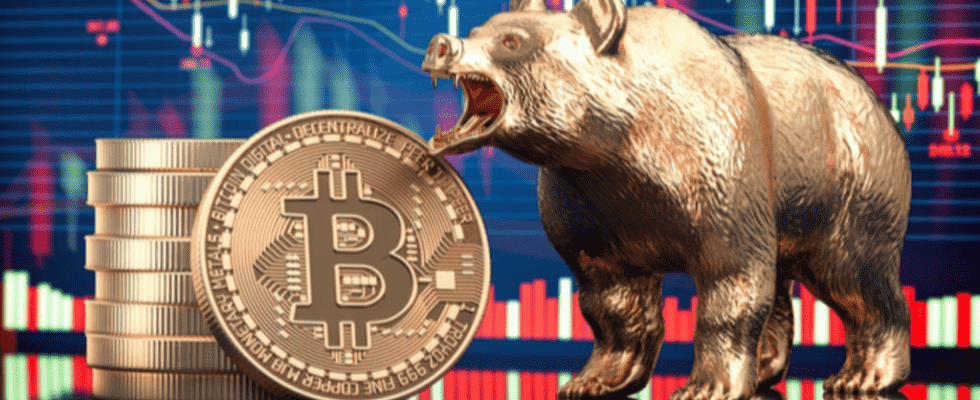Amid escalating geopolitical tensions and a potentially ‘super-size’ Fed rate hike in March, 4 crypto analysts explain why Bitcoin (BTC) could drop further and why investors shouldn’t ‘sell the news’. we too cryptocoin.com We have compiled the posts of famous analysts for our readers.
“Bitcoin (BTC) roller coaster ride will not end anytime soon”
On Friday, the risk of Russia invading Ukraine still seems high, although US Secretary of State Antony Blinken is scheduled to meet next week to meet with Russian Foreign Minister Sergei Lavrov. As inflation remains at a 40-year high, the likelihood of faster-than-expected rate hikes from the Federal Reserve continues to rise.
Cryptocurrencies aren’t doing any better these days either. According to CoinMarketCap data, the global crypto market cap has slumped to $1.82 trillion. According to OANDA senior market analyst Edward Moya, the double blow of geopolitical tension and persistent inflation has dampened crypto market performance because the leading cryptocurrency is the ‘ultimate risk asset’. In a note, the analyst comments:
Bitcoin is a reluctant participant in the volatility that has hit all risky assets from Russia-Ukraine tensions. Bitcoin’s roller coaster ride isn’t going to end anytime soon, but it could turn ugly if Wall Street sees a massive sell-off as investors begin to anticipate a protracted military confrontation.
Edward Moya adds that further pressure may come on the crypto market next week as President Joe Biden is expected to issue an executive order that could pose risks to cryptocurrencies and some stablecoins.

Marcus Sotiriou: Ukraine tension poses threat to crypto markets
Joe Biden also said that if Russia decides to invade, it will shut down the Nord Stream 2 pipeline. Marcus Sotiriou, an analyst at UK-based digital asset broker GlobalBlock, said in a statement:
This pipeline supplies a significant portion of Europe’s natural gas. Therefore, if it is closed, it could cause oil prices to rise and therefore inflation to become more of a problem.

According to Marcus Sotiriou, high inflation has the potential to push the US into recession, due to the reason for raising Fed funds rates and slower growth due to aggressive monetary policy. The analyst comments:
This is why Russia-Ukraine tensions pose a threat, especially to cryptocurrency markets, which have been significantly affected by aggressive monetary policy.
Yuya Hasegawa sees the upside move for Bitcoin quite limited
Yuya Hasegawa, a crypto market analyst at BitBank, agrees that the situation on the Russia-Ukraine border could make or break the Bitcoin price. But more depends on upcoming inflation data, including the February jobs report and the March CPI data before the FOMC for the same month. In a research note released Friday, he highlights:
Depending on these inflation data in particular, the worst may still be ahead. Even if the price rebounds from the current level in the short term, upside action is likely to be quite limited unless the Russian military shows some signs of pullback.

Joseph Edwards, head of financial strategy at Solrise Group, agrees that it is ‘extremely likely’ that a conflict will lead to further declines in crypto prices. He thinks Bitcoin could see new lows at some point this year and slide back to the $33,000 support area given the catalysts.
Joseph Edwards: Sell the rumor or don’t sell it at all
Amid increasing volatility and uncertainty in the financial markets, some investors are taking a wait-and-see approach, while others are trying to follow the motto of ‘buy the rumor, sell the news’. According to Joseph Edwards, the biggest thing investors should avoid is trying to sell the news.
Sell the rumor or don’t sell at all. The most important thing to remember is that crypto has bottomed very early before it bounces off the strongest of all in 2020 compared to most assets, and we tend to think that a potential clash would represent a short-to-medium-term shock rather than a fundamentally macro change.

Indeed, Bitcoin dropped as low as $3,867 in March 2020 before surging above $20,000 at the end of the year. Fundstrat’s head of research, Tom Lee, noted in a research note Friday that historically, markets have tended to sell against the risk of conflict and stabilize when conflict begins:
If you listen to the experts, most people recommend staying ‘risk-off’ because there is little clarity on the extent of the conflict. But that is not what history suggests.
The impact of any financial sanctions on Proof of Work (PoW) mining in Russia, which is now the third largest Bitcoin miner in the world, could be another concern, according to Cambridge University data. However, Joseph Edwards says Russia’s footprint is still relatively limited in the global crypto markets, so any disruption from sanctions should affect market sentiment more than actual structure.
Contact us to be instantly informed about the last minute developments. twitter‘in, Facebookin and InstagramFollow and Telegram and YouTube join our channel!

Disclaimer: The articles and articles on Kriptokoin.com do not constitute investment advice. Cryptokoin.com does not recommend buying or selling any cryptocurrencies or digital assets, nor is Kriptokoin.com an investment advisor. For this reason, Kriptokoin.com and the authors of the articles on the site cannot be held responsible for your investment decisions. Readers should do their own research before taking any action regarding the company, asset or service in this article.
Warning: Citing the news content of Kriptokoin.com and quoting by giving a link is subject to the permission of Kriptokoin.com. No content on the site can be copied, reproduced or published on any platform without permission. Legal action will be taken against those who use the code, design, text, graphics and all other content of Kriptokoin.com in violation of intellectual property law and relevant legislation.
